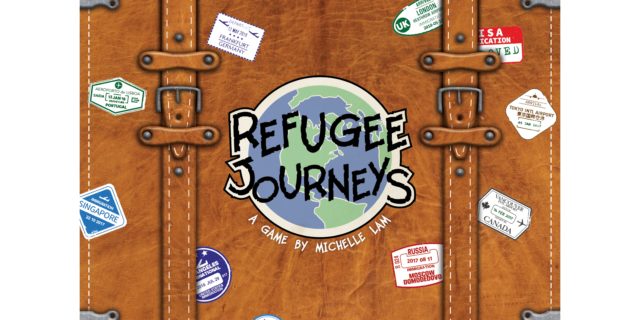
By
Michelle Lam
January 2020
Print Version
What you need to know
Although integration is described as a 2-way street process, where both newcomers and Canadians change and accommodate, few tools exist to help non-newcomer Canadians learn about integration. The Refugee Journeys Board Game is a way to meet this demand and to provide a launchpad for discussions around topics such as identity, intersectionality, integration, race, culture, values, and more. Participants involved in this board game project report an increase in empathy for newcomer groups arriving in Canada and knowledge about policies, procedures, and the experiences of others.
Why this research is important
The Canadian government holds a two-way street model of integration as an ideal, where both newcomers and Canadians adapt for and benefit from one another. However, the vast majority of settlement and integration education seeks to educate newcomers about Canada, with a paucity of resources dedicated to educating Canadians about the experiences of newcomers. In an environment of increasing populism and xenophobia, research-based resources that can educate and prompt empathy, imagination, and understanding for the experiences of others are needed. This research focuses on the outcomes of a tool developed to meet this need, the Refugee Journeys Board Game.
How this research was conducted
To play the Refugee Journeys Board Game, players progress from “Start” to “Finish” around a circular path. They play with an identity card, which details different aspects of their identity, such as age, language ability, cultural background, sexuality, health, and others. As they progress through the game, players pick up experience cards that impact their progression in the game. For example, a card may set them back, cause them to lose time, or move them forward. No two people play the game the same way, and different identities will experience the game differently, highlighting systemic issues and inequalities. After each experience card is played, players engage in a guided discussion about how that experience would impact their identity. Players are invited to share their own experiences with each topic if they wish.
What the researcher found
The project involved using the game with three groups of high school students, post-secondary students, educators, and researchers at two different locations in Western Canada. After each game was played, the researcher collected feedback from players through a feedback form. Players reported that the game increased their knowledge about experiences newcomers may go through, and they reported higher levels of empathy. Many identified an appreciation for “putting players in the shoes of refugees.” As one player commented, “As players, you discuss these issues not merely as concepts but as human realities.”
How this research can be used
The Refugee Journeys Board Game is available here: https://www.thegamecrafter.com/games/refugee-journeys. It can be used to educate community members, students, educators, administrators, or service providers about the integration experiences of newcomers to Canada. Playing a board game can provide people with a space to talk about these issues in a non-threatening environment and can build new knowledge and relationships between players.
The Refugee Journeys Board Game would not be possible without the many stories of newcomers shared through other research, media, or personally. It is necessary to acknowledge them and the participants who shared their time and feedback. This research project has been approved by the University of Manitoba Research Ethics Committee.
Acknowledgements
The Refugee Journeys Board Game would not be possible without the many stories of newcomers shared through other research, media, or personally. It is necessary to acknowledge them and the participants who shared their time and feedback. This research project has been approved by the University of Manitoba Research Ethics Committee.
About the Researcher
Keywords
- community
- education
- identity
- learning
- rural
Publications Based on the Research
Lam, M. (2018). “We can’t paint them with one brush”: Creating opportunities for learning about refugee integration. Refuge: Canada’s Journal on Refugees, 34(2), 103–112. https://doi.org/10.7202/1055581ar
Lam, M. (2018, June 17). Playing this board game will challenge your ideas about refugees. The Conversation. Retrieved from http://theconversation.com/playing-this-board-game-will-challenge-your-ideas-about-refugees-97538
Lam, M. (2017). Refugee journeys: Identity, intersectionality, and integration. Madison, W.I.: Birdlight Games. https://www.thegamecrafter.com/games/refugee-journeys
Editor: Christiane Ramsey
Read more BU Research
Research at Brandon University follows comprehensive policies designed to safeguard ethics, to ensure academic integrity, to protect human and animal welfare and to prevent conflicts of interest.

